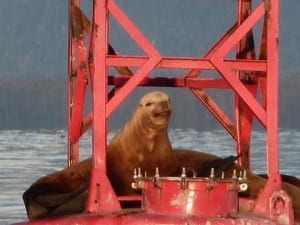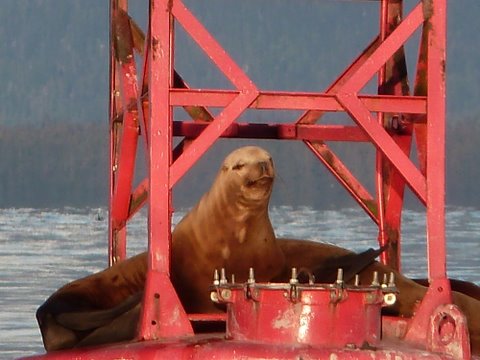Petersburg’s harbor board is recommending a ban on throwing fish scraps in the inner harbor as a first step in fixing the harbor’s aggressive sea lion problem. The board last week voted for the ban, which would require fishermen to dump their carcasses beyond the docks.

The board says the ban is a potential short-term solution to the problem of sea lions that have overtaken the harbor. The increase in the animals near the docks has been partially caused by fishermen throwing carcasses into the water. So the hope is that without fish waste to attract the animals, the sea lions will leave.
While the board agreed that the ban would fix part of the problem, some members felt it was just the first step towards a much larger solution. Jerod Cook with the National Marine Fisheries Service attended the meeting. He said that even if he does start to enforce marine mammal harassment laws more, it won’t fix the problem completely.
“Cause people will still know if I’m around or not,” Cook said. “I would rather fix the problem and work with the community than sitting down there writing tickets for folks.”
Board chair Michael Banks offered his own, larger solution to the problem. He envisioned a floating fish station as the answer.
“The big picture is designing something – I envision a keyway into a fish cleaning station with a skiff that has a tote, and they all go in a tote. And then the skiff goes over to the cannery once a day, or the PIA takes it or something,” Banks said. “Just some simple, inexpensive way of dealing with it.
That solution could be possible, as Harbormaster Glo Wollen says the harbor just received a $226,000 grant from the Alaska Department of Fish and Game for a new floating cleaning station.
The board tossed around a few other ideas, such as grinding up the carcasses and depositing them in the sewer. But as of now, those ideas are still just that – ideas – many of which could take months or years to implement. But board member Bob Dolan said that by implementing the ban now, Petersburg could start fixing the problem immediately.
“What we’re trying to do right now is the simplest thing to try to address it,” Dolan said. “It’s not a regulation. This is a serious problem.”
The board still has work to do, such as determining exactly far from the dock a fisherman needs to be to throw a carcass into the water. But the members said they’ll work with Cook and Wollen to figure those details out. A draft ordinance could go to the assembly in July.












